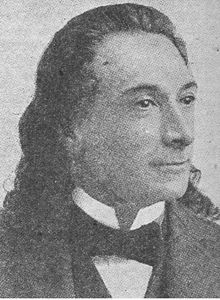- Naftali Herz Imber
-
Naphtali Herz Imber (Hebrew: נפתלי הרץ אימבר, Yiddish: נפתלי הערץ אימבער, also known as Naphtali Tzvi Imber, Naphtali Zvi Imber, Naphtali Hertz Imber or Naphtali Hirsch Imber, 1856 – 8 October 1909) was a Jewish poet and Zionist who wrote the lyrics of Hatikvah, the national anthem of the State of Israel.
Imber was born in Złoczów (now Zolochiv, Ukraine), a town in Galicia, Austrian Empire. He began writing poetry at the age of 10 and several years later received an award from Emperor Franz Joseph for a poem on the centenary of Bukovina's joining to the Austrian Empire. In his youth he travelled in Hungary, Serbia, and Romania.
In 1882 Imber moved to Palestine as a secretary of Sir Laurence Oliphant. In 1886 in Jerusalem he published his first book of poems entitled Morning Star (Hebrew: ברקאי, Barkai). One of the book's poems was Tikvateinu ("Our Hope"); its very first version was written yet in 1877 in Iaşi, Romania. This poem soon became the lyrics of the Zionist anthem and later the Israeli national anthem Hatikvah.
In 1887 he returned to Europe and lived in London; then travelled again, visited India and finally moved to the United States in 1892. Imber made a mockery of the serious and had a sardonic vulgar wit.[1] He also translated the Omar Khayyam into Hebrew. He died in New York in 1909 from the effects of chronic alcoholism; in 1953 was re-interred in Jerusalem.
References
- ^ Louis Lipsky (1927) Thirty Years of American Zionism Published by Ayer Publishing, 1977 ISBN 0405102631 pp 11-12
Categories:- 1856 births
- 1909 deaths
- People from Zolochiv
- Modern Hebrew writers
- Jewish poets
- Zionists
- Jews from Galicia (Eastern Europe)
- Ukrainian Jews
- Polish Jews
- Jews in Ottoman and British Palestine
- National anthem writers
- Alcohol-related deaths in New York
Wikimedia Foundation. 2010.

